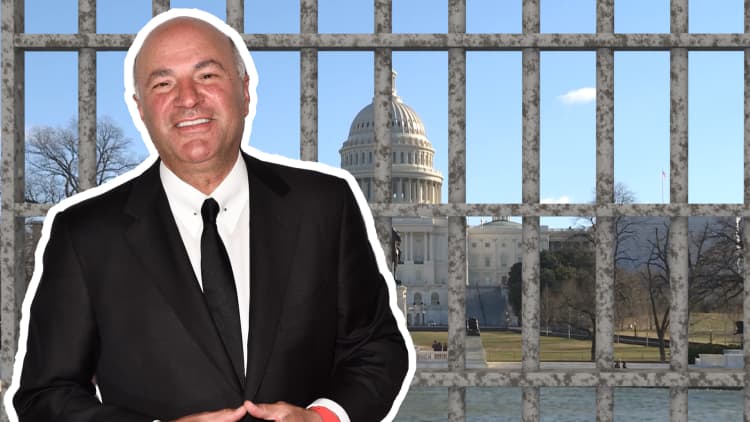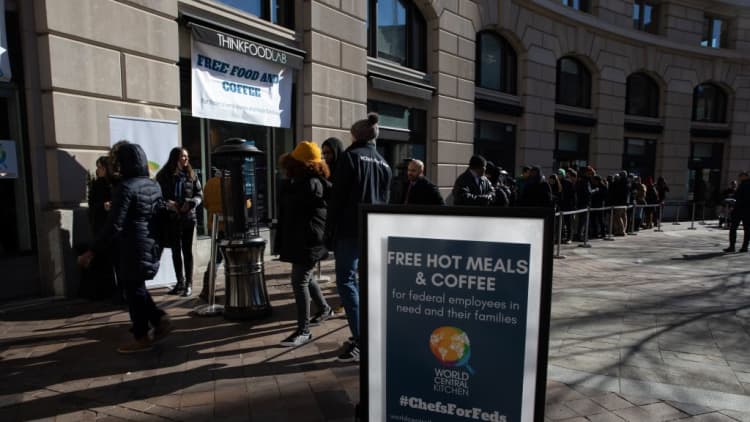Commerce Secretary Wilbur Ross said Thursday on CNBC that government employees affected by the shutdown should simply take out personal loans to cover their expenses. That advice is "completely out of touch with reality," wealth manager and bestselling author David Bach tells CNBC Make It.
Around 800,000 federal employees face the prospect of missing yet another paycheck Friday as the partial government shutdown will enter its 35th day. Each employee has already missed more than $5,000 in wages on average, The New York Times estimates, so many have had to get creative to meet their financial responsibilities. Some have opted to cancel autopay on their bills, skip seeing the doctor, or even sell their car.
Hundreds are also turning to local food pantries and shelters to feed their families. One Chicago-based food pantry told the Chicago Tribune it had helped 130 federal employees since the shutdown started, while a Utah-based organization estimated it had given out supplies to 280 federal employees.
Ross told CNBC he didn't get why federal employees would need to visit food banks.
"I know they are," he said, "and I don't really quite understand why because, as I mentioned before, the obligations that they would undertake – say, borrowing from a bank or credit union – are in effect federally guaranteed."
Workers could be visiting real banks instead, he said: "The 30 days of pay that people will be out – there's no real reason why they shouldn't be able to get a loan against it, and we've seen a number of ads from the financial institutions doing that."
'A reality check'
"Let's do a reality check for our billionaire friends," suggests Bach. He's stunned and angered by Ross's response, he says, and "sickened by what is happening to so many hard working Americans."
The Federal Reserve finds almost half of Americans can't get their hands on $400 in case of emergency, he points out, while four out of five Americans live paycheck to paycheck.
"Many of these 800,000 hardworking Americans are now trying to figure out how to eat," Bach says. "They are trying to figure out how to not lose their homes, cars and apartments."
In this type of situation, he says, "it's quite possible they haven't had the time to look into who will loan them money to survive. It's quite possible they are so stressed out they can't sleep. It's quite possible they are out looking for a new job to put food on the table for their children to survive."
Getting a personal loan isn't always easy
While every bank and credit union has different lending policies, LendingTree's marketplace offers loans to those with credit scores as low as 525 — a score that's considered very poor. If you fall below that level, you may find borrowing money much more difficult.
About 16 percent of Americans have very poor credit, or a score of between 300 to 579, according to Experian. And about one in five consumers don't have a credit score or a credit history at all, which can make it more difficult to get a loan.
Some banks and credit unions are stepping up to provide relief, but federal workers with lower credit scores may have few options. Among the big national banks, U.S. Bank introduced a new low-rate (0.01 percent APR), quick loan of up to $6,000 for customers who are federal employees, including those who have mortgages, car loans or credit cards with the bank, but approval does hinge on your credit.
PayPal announced a program to give up to $500 interest-free cash advances to federal workers who use the company's PayPal PYPL Credit service. The service is subject to credit approval, though, according to the service.
Meanwhile, Bank of America, J. P. Morgan Chase and Wells Fargo are not offering loans but are waiving late and overdraft fees.
Some of the more flexible options are from credit unions. The U.S. Employees Credit Union, for example, provides interest-free loans to their members for amounts based on their current government paycheck. Approval is not based on a credit score.
The Navy Federal Credit Union is also offering interest-free loans of up to $6,000 for federal employees and contractors. The loans are for 60 days or whenever their pay is reinstated — and no credit check is needed.
What to do if you can't get a loan
Start with credit cards, says personal finance expert Suze Orman. The problem, though, is that roughly one in three Americans worry about maxing out their credit card with a large purchase (anything over $100), according to a recent WalletHub credit cards survey.
If you are at your limit, you could try calling the credit card and explaining the situation. And if you're approved, plan to start paying down the balance as soon as the government reopens.
If necessary, you could also consider taking a loan from your retirement account. Orman says the partial shutdown is an "emergency situation" and federal employees in need of funds can consider dipping into their Thrift Savings Plan (TSP). The TSP is a retirement plan, similar to a 401k, for federal employees.
"This will be the first time in the history of my entire career that I am telling anyone to even consider this," she said during her podcast "Women and Money," "but if you don't have the money to pay your bills — if you don't have any way to feed your children — then you might want to consider taking a loan from your retirement account. … And when and hopefully you do get your back pay, you then can pay it back."
Don't miss: The government shutdown spotlights a bigger issue: 78% of US workers live paycheck to paycheck
Like this story? Subscribe to CNBC Make It on YouTube!




